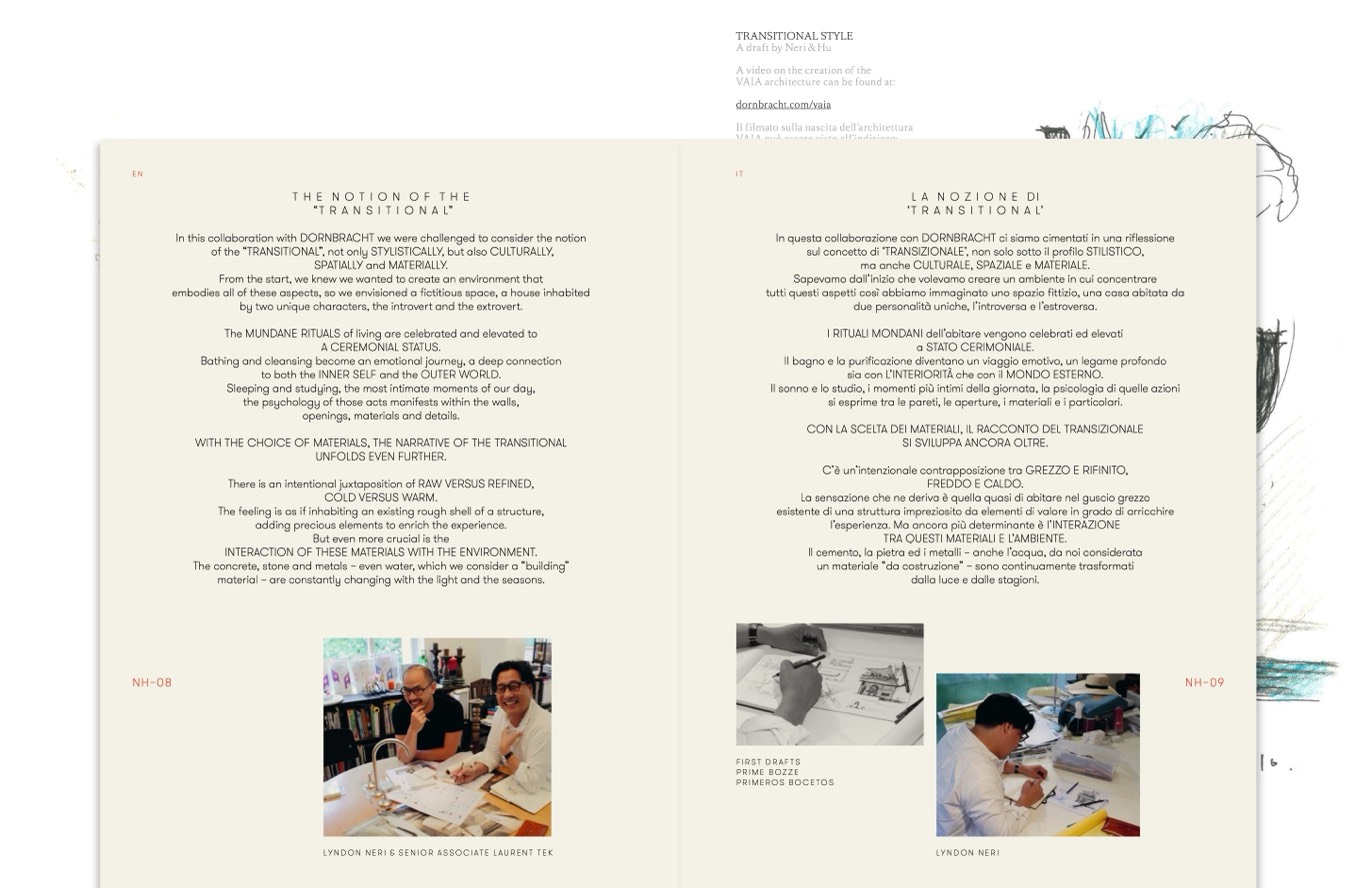
TRANSITIONAL STYLE
A draft by Neri & Hu
A video on the creation of the
VAIA architecture can be found at:
dornbracht.com/vaia
Il filmato sulla nascita dell’architettura
VAIA può essere visto all’indirizzo:
dornbracht.com/vaia
IT
Encontrará el vídeo sobre el origen
de la arquitectura VAIA en:
dornbracht.com/vaia
LA NOZIONE DI
‘T R A N S I T I O N A L’
In questa collaborazione con DORNBRACHT ci siamo cimentati in una riflessione
sul concetto di ‘TRANSIZIONALE’, non solo sotto il profilo STILISTICO,
ma anche CULTURALE, SPAZIALE e MATERIALE.
Sapevamo dall’inizio che volevamo creare un ambiente in cui concentrare
tutti questi aspetti così abbiamo immaginato uno spazio fittizio, una casa abitata da
due personalità uniche, l’introversa e l’estroversa.
I RITUALI MONDANI dell’abitare vengono celebrati ed elevati
a STATO CERIMONIALE.
Il bagno e la purificazione diventano un viaggio emotivo, un legame profondo
sia con L’INTERIORITÀ che con il MONDO ESTERNO.
Il sonno e lo studio, i momenti più intimi della giornata, la psicologia di quelle azioni
si esprime tra le pareti, le aperture, i materiali e i particolari.
CON LA SCELTA DEI MATERIALI, IL RACCONTO DEL TRANSIZIONALE
SI SVILUPPA ANCORA OLTRE.
C’è un’intenzionale contrapposizione tra GREZZO E RIFINITO,
FREDDO E CALDO.
La sensazione che ne deriva è quella quasi di abitare nel guscio grezzo
esistente di una struttura impreziosito da elementi di valore in grado di arricchire
l’esperienza. Ma ancora più determinante è l’INTERAZIONE
TRA QUESTI MATERIALI E L’AMBIENTE.
Il cemento, la pietra ed i metalli – anche l’acqua, da noi considerata
un materiale “da costruzione” – sono continuamente trasformati
dalla luce e dalle stagioni.
FIRST DRAFTS
PRIME BOZZE
PRIMEROS BOCETOS
LYNDON NERI
NH–09
EN
THENOTIONOFTHE
“T R A N S I T I O N A L”
In this collaboration with DORNBRACHT we were challenged to consider the notion
of the “TRANSITIONAL”, not only STYLISTICALLY, but also CULTURALLY,
SPATIALLY and MATERIALLY.
From the start, we knew we wanted to create an environment that
embodies all of these aspects, so we envisioned a fictitious space, a house inhabited
by two unique characters, the introvert and the extrovert.
The MUNDANE RITUALS of living are celebrated and elevated to
A CEREMONIAL STATUS.
Bathing and cleansing become an emotional journey, a deep connection
to both the INNER SELF and the OUTER WORLD.
Sleeping and studying, the most intimate moments of our day,
the psychology of those acts manifests within the walls,
openings, materials and details.
WITH THE CHOICE OF MATERIALS, THE NARRATIVE OF THE TRANSITIONAL
UNFOLDS EVEN FURTHER.
There is an intentional juxtaposition of RAW VERSUS REFINED,
COLD VERSUS WARM.
The feeling is as if inhabiting an existing rough shell of a structure,
adding precious elements to enrich the experience.
But even more crucial is the
INTERACTION OF THESE MATERIALS WITH THE ENVIRONMENT.
The concrete, stone and metals – even water, which we consider a “building”
material – are constantly changing with the light and the seasons.
EN
First and foremost, NERI & HU understand the idea of Transitional
Style in terms of architecture: the bathroom as a room in which to linger
a while, a room for regeneration, a source of energy and a place of
transition. The washstand as a central, communicative meeting place.
This gives rise to some important resonances for bathroom architecture.
IT
NERI & HU intendono il concetto di Transitional Style soprattutto in
NH–08
senso architettonico: il bagno come luogo di pausa, di rigenerazione,
fonte di energia, spazio di transizione. Il lavabo è un punto centrale,
luogo per incontrarsi e di comunicazione. Ne derivano importanti
citazioni per l’architettura del bagno.
ES
NERI & HU entienden el concepto del Transitional Style sobre todo
desde la arquitectura: el baño como un espacio en el que detenerse,
en el que regenerarse, una fuente de energía, un lugar de transición.
El lavabo como lugar central y comunicativo de encuentro. De aquí
se pueden desprender referencias importantes para la arquitectura
de baños.
LYNDON NERI & SENIOR ASSOCIATE LAURENT TEK

